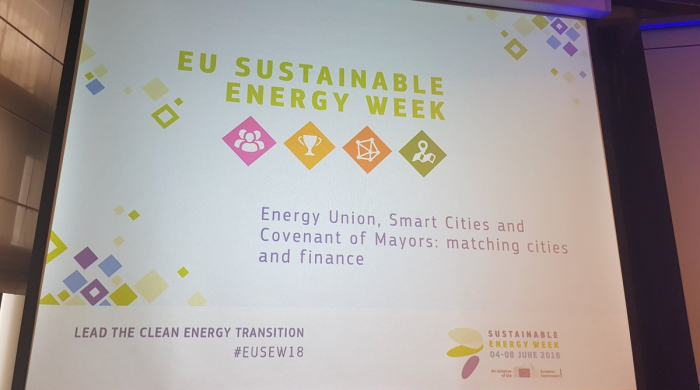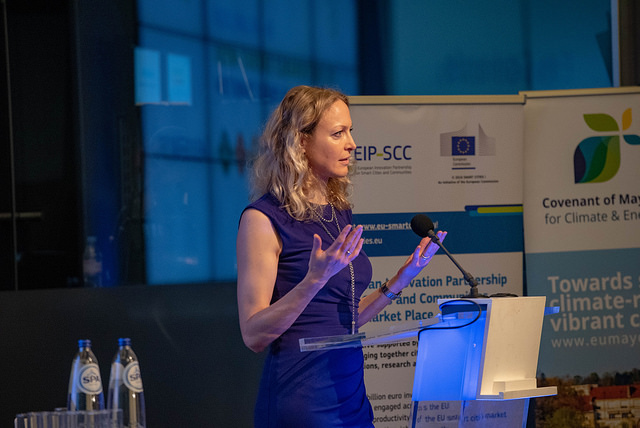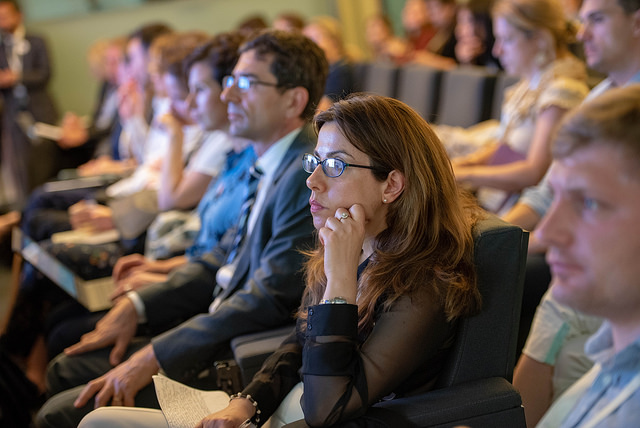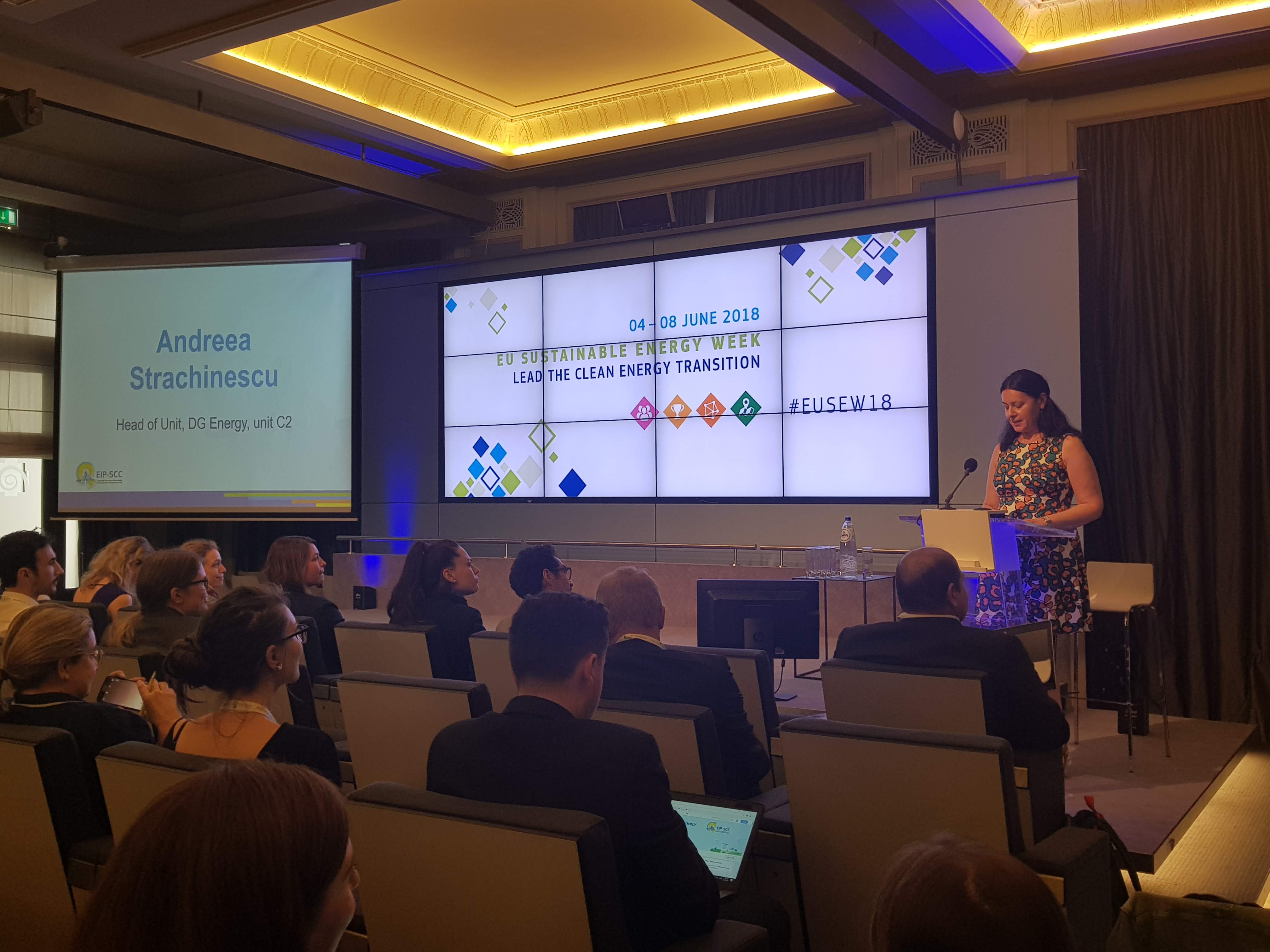
Last month, the EIP-SCC Marketplace participated at the EU Sustainable Energy Week, the annual flagship event uniting policy makers, authorities, industry, stakeholders, NGOs, researchers and academia in the European sustainable energy sector.
The EIP-SCC hosted a stand at the event, at which visitors were introduced to the new EIP-SCC Matchmaking platform set up to engage cities and financiers. Interested visitors were also guided to join the Marketplace community through participation in the Action Clusters and Initiatives.
Then, on Thursday afternoon, in the Residence Palace, close to Charlemagne Building, a discussion session around financing energy-efficiency projects, followed by a matchmaking session between financiers and cities took place.
Andreea Strachinescu, Head of Unit, DG Energy, unit C2, responsible for the SCC01 Lighthouse projects and the EIP-SCC Marketplace, kicked off the afternoon session, in which she highlighted the importance of cities for reaching the EU’s goals. Strachinescu stated that “cities are the motors of the European Economy and indispensable for reaching the EU’s climate targets and achieving the Energy Union goals.” Andreea also officially cut the ribbon of the new EIP-SCC Matchmaking platform, which has now been in use for a few weeks attracting a submission of around 80 projects for the Matchmaking session, which will happen in Sofia at the EIP-SCC Marketplace General Assembly 2018.
Andreea Strachinescu, Head of Unit, DG Energy, unit C2 opening the session
Speeches were made also by the co-organisers of the event: Durmish Guri, Projects Director at CEMR, Covenant of Mayors Office, and Eva Gerhards Deputy Head of Unit, DG Energy, unit A1, responsible for the Energy Union Governance. Both, Guri and Gerhards underlined the importance of collaboration amongst cities and networks, such as the partnership established between the EIP-SCC and Covenant of Mayors. “Cities – as main aggregators of demand – can be part of developing the national Plans and can contribute to achieving the Energy Union acting at the local level” noted Gerhards. Guri also championed the tremendous contribution that the Covenant of Mayors signatories' is providing to achieving the EU objectives of reducing emissions and improving resilience with their local climate and energy actions.

Eva Gerhards, Deputy Head of Unit, DG Energy, unit A1, delivering her speech
Two Horizon2020 Lighthouse projects and one non-EU-funded project were then brought on-board for the organisation of the Matchmaking session. The Covenant of Mayors was instrumental in drawing of these projects to a full participation meant to attract external finance to the cities. The projects were introduced in a presentation by Damian Wagner, project coordinator of the Triangulum H2020 Lighthouse project.
The following cities participated by submitting a pitch:
- Seraing, Belgium (follower city in H2020 project REMOURBAN)
- Umeå, Sweden (lead city in H2020 project RUGGEDISED)
- Újbuda from the 11th district of Budapest, Hungary
The cities each delivered short pitches of smart city solutions, all of which were discussed at individual tables in the subsequent Matchmaking session. Amélie Joveneau – Project Manager at AREBS, Seraing, outlined several projects taking place in one neighbourhood of the city at different development stages, including building deep retrofitting and intermodality.
Carina Aschan – Project Coordinator for the Smart University City Cooperation in Umeå eluded to the harsh weather conditions impacting the city and the smart city solutions put in place to combat. The RUGGEDISED Lighthouse project stationed in the city has been implementing in various sectors, such as an EV-charging infrastructure hub, energy optimised electric BRT-station and geothermal heat/cold storage.
Dr Imre Rimóczi - Deputy Chief of the mayor's cabinet at Újbuda Municipality’s 11th District of Budapest made an interesting pitch about a deep retrofit project in the district. The Project implementation period has already been terminated, the project has not obtained financial support from the central government in terms of grants – leaving only 2 out of the 14 sites conducted on, and the rest seeking finance.
You can find the pitch presentations available here.

After the pitches, the cities then had direct one on one discussions with financial partners that showed interest. The cities then moved to the atrium of the Residence Palace where the cities, financial partners and the rest of the 75 participants came together for the matchmaking session, to discuss potential cooperation projects, including replication projects based on the examples presented.
Footage from the event is avaialble below:

